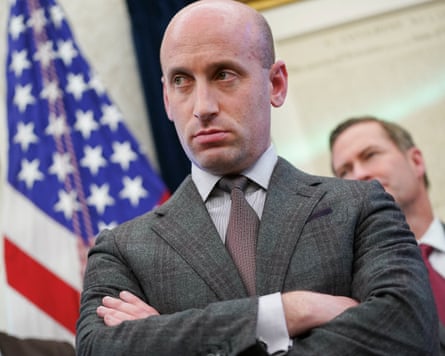The anger was raw and resolute. Speaking at the Republican congressman Mike Flood’s town hall in Lincoln, Nebraska, a woman pointed to the estimated $450m cost of “Alligator Alcatraz”, an immigration detention facility in Florida. “How much does it cost for fascism?” she demanded. “How much do the taxpayers have to pay for a fascist country?”
The crowd erupted in applause and whoops. In the week that Donald Trump marked his 200th day in office, few mainstream political commentators are bandying around terms such as “fascist”. But many are warning of a societal march towards authoritarianism that, far from losing momentum, appears to be gathering pace.
Over the past month the US president has demanded that his predecessor, Barack Obama, be prosecuted for “treason”, fired the government’s top labour statistician following a weak jobs report and forced Columbia University to pay more than $200m in a settlement that many saw as capitulation.
Trump has also egged on Republicans in Texas and other states to redraw congressional maps so they favour his party in future elections – turning the FBI on dissenting Democrats – and ordered a new census that excludes people “who are in our Country illegally”.
And his administration has pursued a hostile takeover of the nation’s capital, Washington DC, threatening to place the city under federal control, promising to restore a Confederate statue toppled by Black Lives Matter protesters and executing a radical makeover of the White House itself.
The trend line is clear to Trump’s critics. Rachel Maddow, a leading progressive TV host, told viewers of her show on the MSNBC network this week: “We do now live in a country that has an authoritarian leader in charge. We have a consolidating dictatorship in our country.”
Terms such as “fascist”, “authoritarian” and “dictatorship” were once dismissed as the refuge of those suffering “Trump derangement syndrome”. Not any more. There is now a growing consensus that the pillars of US democracy are being demolished one by one.
Matt Bennett, an executive vice-president of Third Way, a centrist thinktank hardly prone to hyperbole, said: “It’s getting dramatically worse by the day. The question of whether we’re in a constitutional crisis or whether authoritarianism has arrived is kind of an academic one. It’s either here or it’s going to be here very soon.
“We’re still short of them openly defying a supreme court ruling or intentionally deporting US citizens or attempting to shut down a news media operation. But we’re not very far short.”
The assault on the constitution is wider and deeper than in Trump’s first term, when he arrived in the Oval Office like a trainee pilot sitting in the cockpit of a Boeing 747, overwhelmed by its array of dials and controls. Now he and his allies – notably his deputy chief of staff, Stephen Miller – know precisely which levers to pull and how little air resistance they are likely to meet.
Having promised to be a dictator only on “day one”, Trump got to work pardoning supporters involved in the 6 January 2021 riot at the US Capitol, installing loyalists at the justice department and FBI and recruiting the billionaire Elon Musk to scythe through government agencies, sidelining Congress along the way.
The president repeatedly challenged judicial rulings, even calling for the impeachment of judges who rule against his administration. After a judge blocked a deportation order, Trump called him “crooked” and said he should be “impeached”, prompting a “rare rebuke” from the chief justice, John Roberts.
The administration escalated attacks on media outlets it accused of unfavourable coverage, moving some out of their Pentagon workspace or barring them from the Oval Office and Air Force One. It also purged the leadership of the John F Kennedy Center for the Performing Arts, installing Trump himself as chairman.
At the 100-day mark, comparisons were being drawn with autocrats such as Viktor Orbán of Hungary. Two hundred days in, Orbán has been left looking like an amateur by the speed and scale of Trump’s efforts to expand presidential power, undermine institutions and control information.
Simon Rosenberg, a Democratic strategist, said: “He’s clearly made a decision to turn America into some form of dictatorship. There’s no way any longer to look away from that. The excuses – ‘Well, it can’t happen here, American civil society is strong enough to resist’ – may be true, but what’s clear now is that his aspiration is to end American democracy for all time and to turn this country into some kind of authoritarian state.”
Among the starkest examples was Trump’s concerted effort to deflect attention from the Jeffrey Epstein files by baselessly reviving the investigation into Russia’s interference in the 2016 election. The attorney general, Pam Bondi, has directed federal prosecutors to launch a grand jury investigation into allegations that members of Obama’s administration manufactured intelligence.
Then came the abrupt dismissal of the Bureau of Labor Statistics commissioner, Erika McEntarfer, after a jobs report showed downward revisions. Trump accused her of “faking the jobs numbers” and that the figures were “RIGGED in order to make the Republicans, and ME, look bad”, offering only “my opinion” as proof.
Trump’s efforts to dominate US culture are far more sophisticated than in his first term. According to an analysis by the Axios news site, he has extracted more than $1.2bn in settlements from at least 13 of the most elite players in academia, law, media and tech. Among them was a $16m deal with Paramount that critics saw as a “bribe” and coincided with the cancellation of the late-night show of the CBS comedian Stephen Colbert, one of the most incisive satirical voices of the Trump era.
after newsletter promotion
Rosenberg added: “There’s no question that our lack of history with a leader like this, and the perception of American exceptionalism, made many institutional players in our society unprepared for what was to come. The key here is that the way that Trump succeeds is by isolating people and by not allowing people to work together collectively.”
Funding cuts by Republicans in Congress forced the shutdown of the Corporation for Public Broadcasting, dealing a huge blow to the Public Broadcasting Service and National Public Radio. Government websites have been scrubbed of data on the climate and other issues – including, apparently, the constitution itself.
Ominously, the Smithsonian National Museum of American History removed a reference to the 2019 and 2021 impeachments of Trump from a panel in an exhibition about the presidency. A Smithsonian spokesperson said the removal was part of a temporary fix and the exhibit eventually “will include all impeachments”.
Although Trump has faced setbacks in the courts, he shows no signs of slackening his pace. Last month he signed a tax and spending bill that, while stripping health insurance from millions of people, includes a record $170bn for immigration enforcement and detention. Amid concerns over its masked agents snatching people off the streets, Immigration and Customs Enforcement (Ice) will become the biggest domestic police force in the US – and bigger than many countries’ armies.
Larry Jacobs, director of the Center for the Study of Politics and Governance at the University of Minnesota, said: “We’re on a glide path towards the dissolution of the cornerstones of American democracy. It started with Trump and his threats, even to Republicans, and now it’s accelerated to secret police. The billions of dollars going to Ice is going to create the largest police force in the country and it’s beholden to the president.”
Jacobs added: “The next backstop is going to be, will there be competitive elections next year? The gerrymandering in Texas may be a bad sign about whether Democrats and Americans who are ready to vote against Republicans will have that opportunity around the country.”
Despite the concerns over an uneven playing field, the midterm elections remain Democrats’ best chance of checking Trump’s power. They hope to harness the rage boiling over at Republican town halls, such as that held by Flood in Nebraska this week, and at protests such as “No Kings” demonstrations that brought millions of people to the streets.
Indeed, for all his strongman posturing, Trump is deeply unpopular: a University of Massachusetts Amherst opinion poll released this week found his approval rating at just 38%, down six percentage points since April, though only 1% of Trump voters regret their vote. That drop includes men, one of the president’s most reliable groups of supporters.
From his military parade in Washington to his bombing of Iran, from his escalation of immigration enforcement to his so-called “big, beautiful bill”, the American people are rejecting Trump’s leadership and agenda, according to Rosenberg, the Democratic strategist.
“A majority of the country now knows that he’s the old man behind the curtain and not the wizard,” he said. “He still has control over Maga and Republicans in Congress but he doesn’t have the persuasive capacity any longer to keep his hold on the broad majority of the country.
“This is a sign of his weakness and that he’s not as strong as he believes he is. It’s one of the reasons why he’s looking for these avenues to re-establish his strength and power and have there be a perception that people are bending the knee.
“Every time he tries to do this, it fails and he grows more distant to the American people. That has to give us hope we have the tools in the coming months to start winning elections and building a more successful pro-democracy movement that can contain the damage that Trump and Maga are doing to the country in the coming years.”










